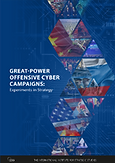NOTABLE LINKED RESEARCH
Social Cyber Institute researchers and Fellows publish their work in external sources, such as book publishers, think tanks and journals on a wide range of interests, often in edited or co-edited volumes. This list includes publications involving SCI researchers or Fellows since they joined the Social Cyber Institute in some capacity.
The five generations of facial recognition usage and the Australian Privacy law (International Data Privacy Law, June 2024)
This article co-authored by Jorge Conde of ANU and Professor Dan Svantesson describes the advances in face mining technologies and aligns these with Australian data privacy law, explaining the division of facial recognition usage into five generations. The article analyses the risks and gaps in data privacy laws, particularly within the Australian context, and offers recommendations for reform. Australian law regulates biometric data, including facial biometric data (FBD), as sensitive information. However, the legislation and regulatory focus are primarily on what may be termed the second-generation use of FBD; that is, for automated verification or identification. Australia is undergoing a reform of its data privacy law, which may impact the regulation of FBD. The reform proposals include redefining personal information to include inferred information and creating a non-exhaustive list of personal information types. The reform also suggests updating the categories of sensitive information and considering the regulation of biometric technologies.

This IISS Research Report concludes that the United States enjoys a comfortable lead over China in quantum-sensing research-and-development owing in large part to the much-larger scale of US efforts, their relative quality, the longer institutional development of research and education capabilities, and the superiority of the US quantum-sensing industry. This report compares the research-and-development capabilities of the United States and China in the field of quantum sensing. It concludes that in the coming decade, Washington will likely be significantly better placed than Beijing to achieve and deploy breakthroughs in this technology for national-security purposes.

Impact of the Ukraine War on National Cyber Policy: A Survey of Ten Countries (IISS, January 2024)
This survey of ten countries shows how radically they have reacted to the unprecedented cyber operations of the Russia–Ukraine war. The report also flags important lessons about the strategic character of cyber operations in modern war. Russia’s war against Ukraine has involved the most extensive and continuous use of hostile cyber operations by one state against another in history. What has the world learnt about cyber power as a result? This paper explores how ten countries – Canada, Finland, France, Germany, Japan, the Netherlands, Poland, Sweden, the United Kingdom and the United States – have responded to the war in the cyber domain.
This report is the second volume in a two-part series using the IISS methodology for assessing national cyber power. The first volume assessing 15 states was published in 2021. In this volume, co-edited by Professor Greg Austin, the IISS assess Brazil, Estonia, Germany, the Netherlands, Nigeria, Saudi Arabia, Singapore, South Africa, Turkiye and the United Arab Emirates (UAE).

'Great Power Offensive Cyber Campaigns', co-authored by Greg Austin, Kai Lin Tay and Munish Sharma, is a comparative study of the offensive cyber operations of the United States, Russia and China based on ten case studies. Their leaders would have seen the value of the campaigns in terms of diplomatic signalling, including both as a demonstration of a capability and for the purposes of retaliation. At the same time, we found that none of the campaigns would have been seen by the perpetrators as an exercise in coercive diplomacy in the normal meaning of the term.

One of the most profound influences on the evolution of a country’s military cyber forces and strategies is politics. This paper, co-authored by Dr Greg Austin and Dr Jason Blessing, offers insights into how the governance and organisational factors of domestic politics facilitate or inhibit the dissemination of cyber concepts and capabilities throughout military forces beyond the main signals or cyber intelligence agency. This paper provides an impact matrix which can be used by governments, their armed forces and research analysts to understand the ways in which military cyber reforms can be facilitated or inhibited by governance and organisational processes

This book is the result of a two-year multi-author study, assessing fifteen countries, co-edited by Professor Greg Austin and including several contributions by him. The report concludes that China lags behind the US in cyber power. The other countries studied were the UK, Canada, Australia, France, Israel, Japan, , Russia, North Korea, Iran, India, Indonesia, Malaysia and Vietnam.

This book documents and explains civil defence preparations for national cyber emergencies in conditions of both peace and war. The volume analyses the escalating sense of crisis around state-sponsored cyber attacks that has emerged since 2015, when the United States first declared a national emergency in cyberspace. It documents a shift in thinking in the USA, from cooperative resilience-oriented approaches at national level to more highly regulated, state-led civil defence initiatives. Read more

Once the preserve of small groups of dedicated educators and industry professionals, the subject is now on the frontlines of geopolitical confrontation and business strategy. Global shortages of talent have created pressures on corporate and national policy for workforce development. Cyber Security Education offers an updated approach to the subject as we enter the next decade of technological disruption and political threats. Read more


